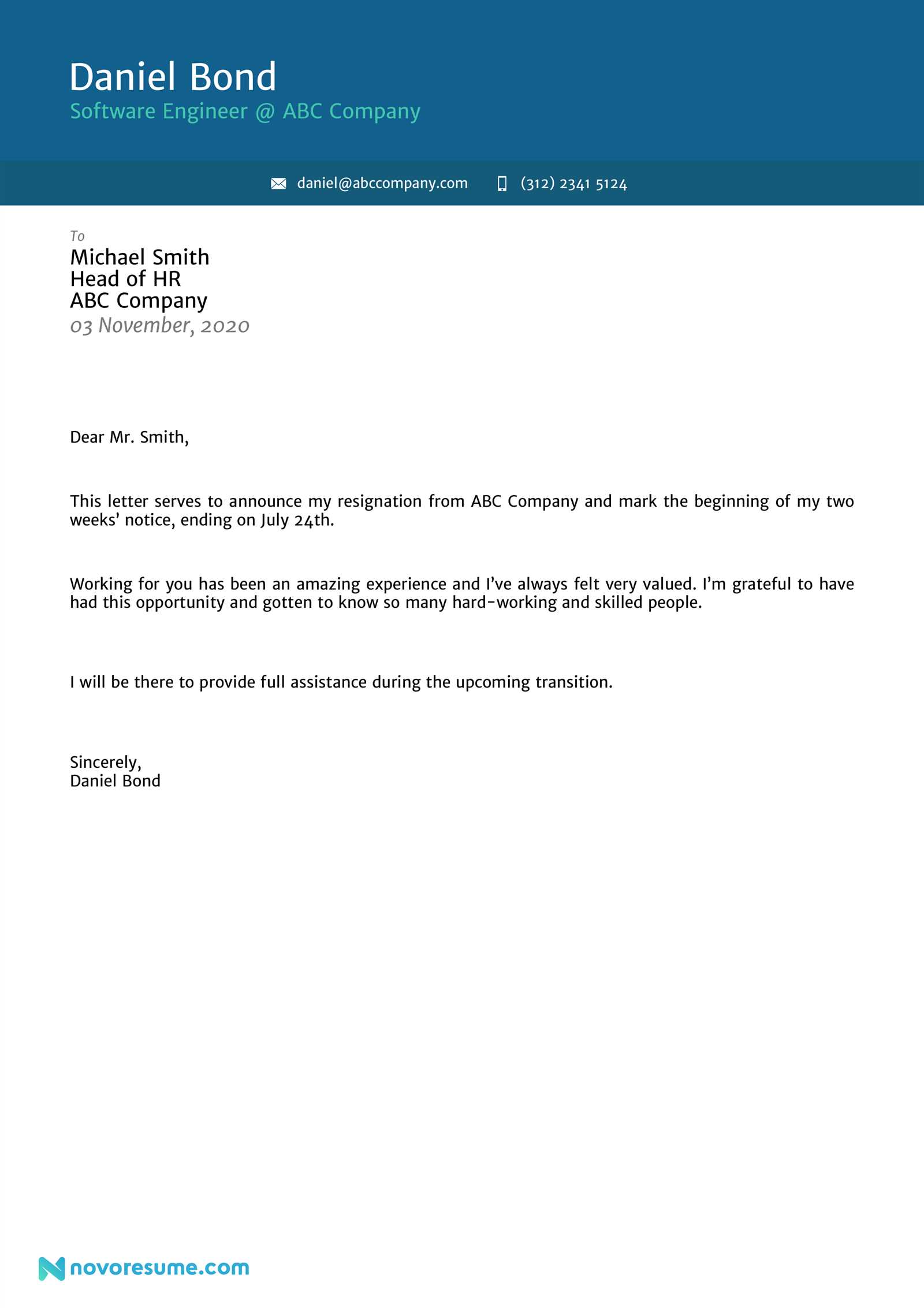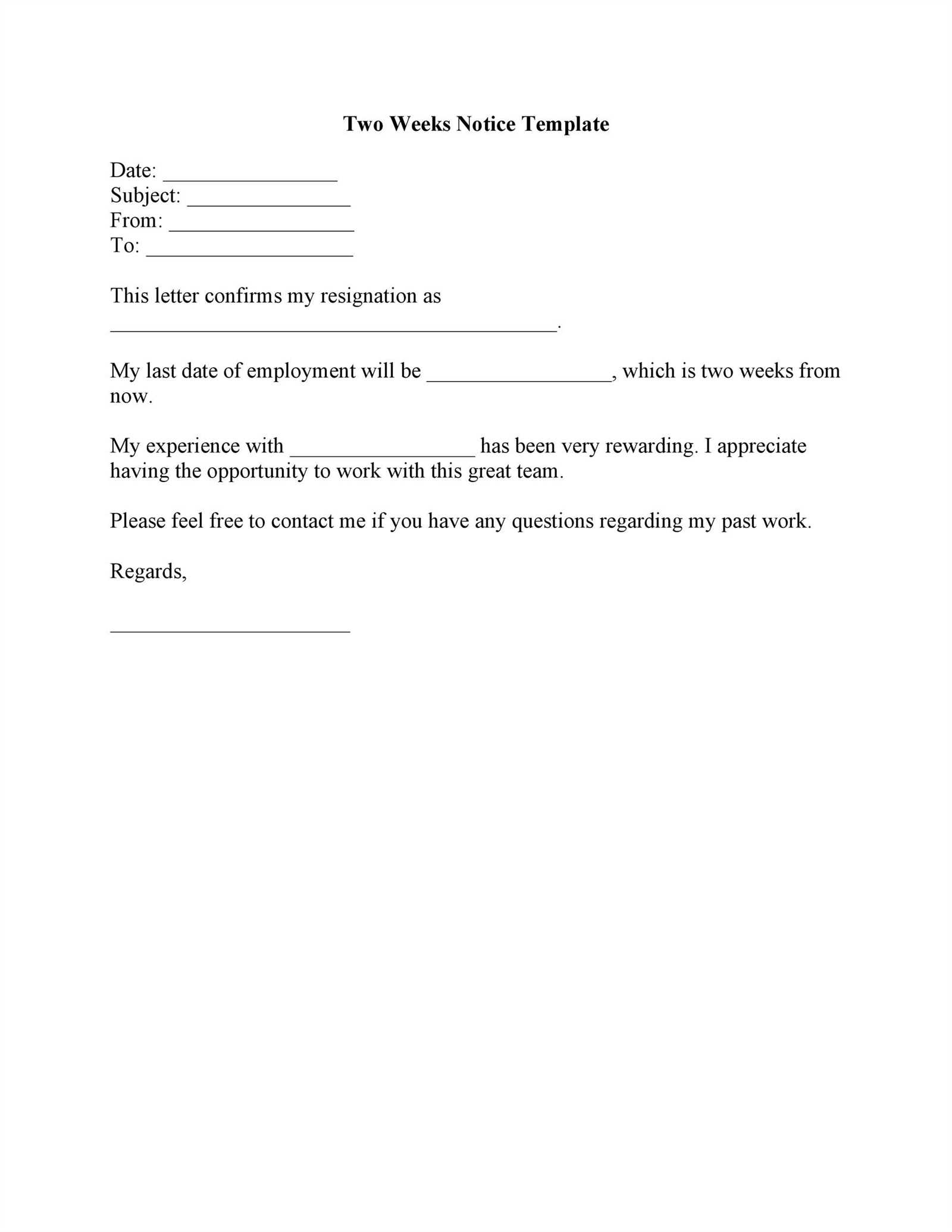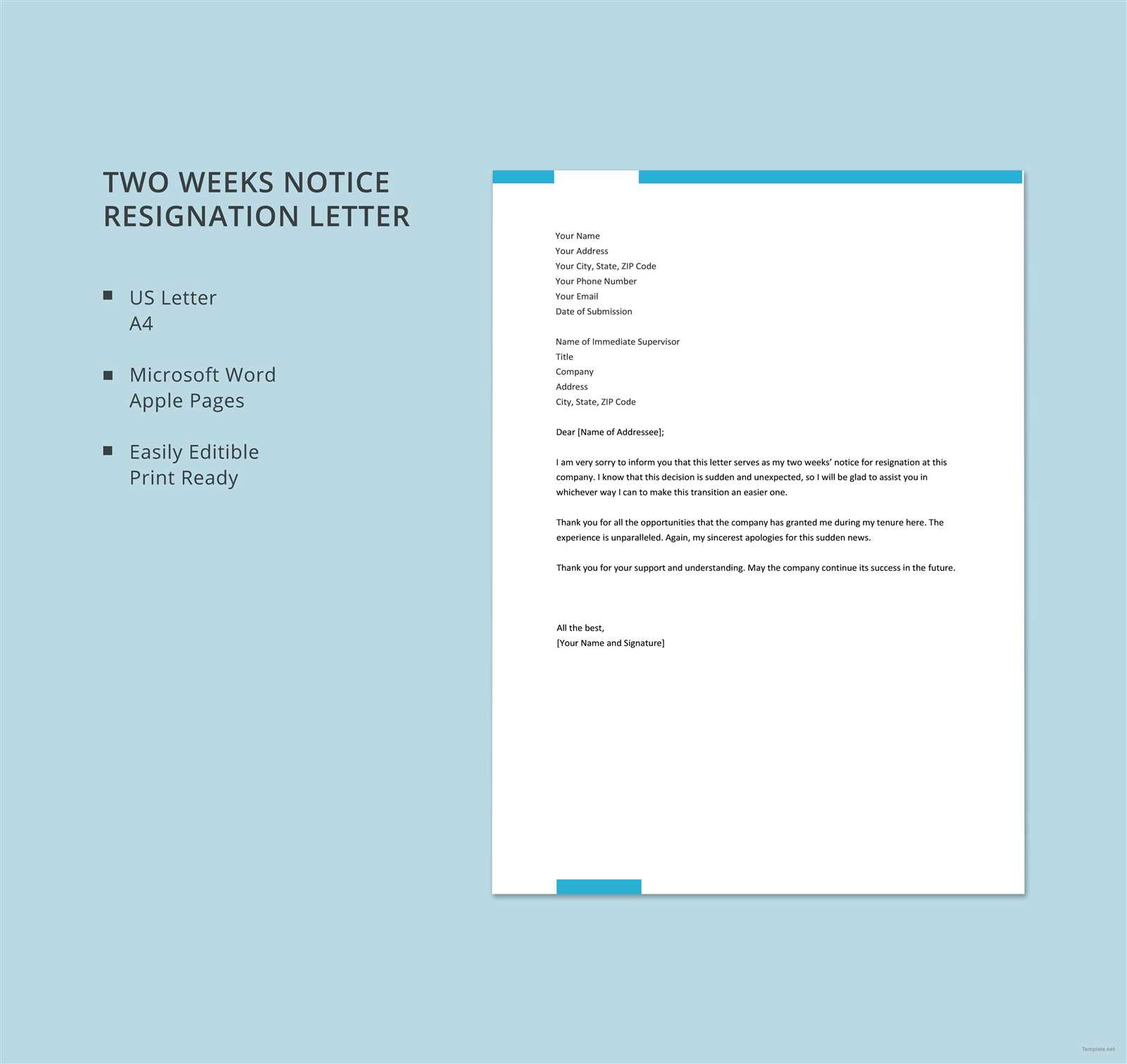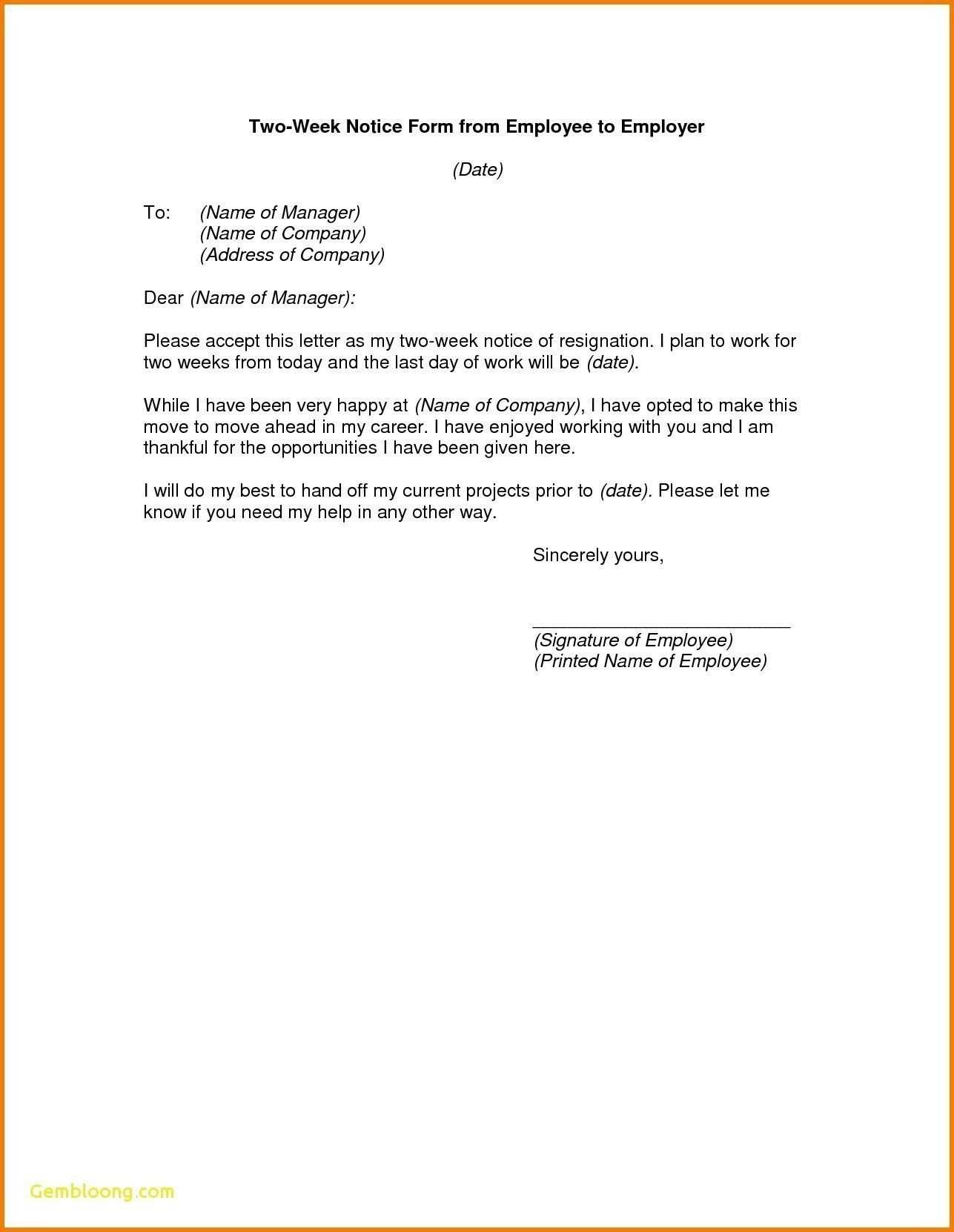3 Week Notice Letter Template for Resignation

When the time comes to move on from your current role, it’s important to leave on good terms with your employer. Providing advance notice of your decision to resign is a professional and courteous way to ensure a smooth transition. It shows respect for the company and gives them time to prepare for your departure.
In this guide, we will walk you through the essential components of a formal resignation, offering practical advice on how to convey your message clearly and respectfully. You’ll learn how to phrase your communication to maintain a positive relationship with your employer, even after you’ve decided to move forward in your career.
How to Write a 3 Week Notice
When leaving a job, it’s important to communicate your intentions clearly and professionally. This allows your employer time to make necessary arrangements and shows your respect for the organization. A formal resignation should be direct, polite, and concise, ensuring a positive exit experience.
Steps to Take Before Resigning
- Ensure your decision is final and well-thought-out.
- Review your contract or company policies for any requirements regarding resignation.
- Prepare a brief explanation for your departure, keeping it professional.
How to Structure Your Communication

- Start with a clear statement of your intention to resign.
- Include the exact date of your intended departure.
- Offer assistance with the transition process, such as training your replacement or completing outstanding tasks.
- End on a positive note, expressing gratitude for the opportunity.
Key Elements to Include in Your Letter
When informing your employer about your decision to resign, it’s crucial to provide all necessary details in a structured manner. A well-crafted communication should include essential components that convey your intent clearly while maintaining professionalism.
Crucial Information to Mention

- Your clear intention to leave the role.
- The specific date of your last day at the company.
- A brief reason for your decision, if appropriate, without going into unnecessary detail.
Polite and Professional Tone
- Express gratitude for the opportunity and experiences gained during your time with the organization.
- Offer assistance with the transition, such as training someone to take over your responsibilities.
- Maintain a positive tone, focusing on leaving amicably and professionally.
Professional Tone and Language Tips
When resigning from a position, it’s important to convey your message respectfully and tactfully. Using appropriate language ensures that your departure is understood as a professional decision, preserving good relationships with your employer and colleagues.
Maintaining a Respectful and Polite Approach
- Start with a formal greeting, such as “Dear [Manager’s Name].”
- Avoid negative or critical language about the company or coworkers.
- Express your appreciation for the opportunities provided during your tenure.
Choosing Clear and Concise Language
- Be straightforward about your intentions without over-explaining.
- Avoid overly casual expressions; keep the tone professional throughout.
- Ensure clarity in your final working date and any transition plans you propose.
Common Mistakes to Avoid When Resigning
Leaving a position requires careful consideration to ensure the process goes smoothly. Avoiding common pitfalls can help maintain a positive relationship with your employer and leave a good impression on your colleagues.
Mistakes Related to Timing
- Not providing enough time for your employer to prepare for your departure.
- Resigning during critical company periods, such as busy seasons or major projects.
- Not confirming your final working day clearly, leading to confusion.
Communication Errors
- Failing to keep your message professional and polite.
- Not expressing gratitude for the opportunities and experiences at the company.
- Leaving without offering help during the transition period.
Examples of 3 Week Notice Letters
Providing a clear and professional message is essential when resigning. Below are a few examples that demonstrate how to structure your resignation. These examples can be used as a guide for creating your own communication, tailored to your specific situation.
| Example 1 |
Dear [Manager’s Name], I am writing to inform you of my decision to resign from my position at [Company Name]. My last day will be [date], allowing ample time for a smooth transition. I greatly appreciate the opportunities I have had during my time here and would be happy to assist in any way during this transition period. Thank you for your understanding, and I wish the team continued success. Sincerely, [Your Name] |
|---|---|
| Example 2 |
Dear [Manager’s Name], After careful consideration, I have decided to resign from my role at [Company Name]. My final working day will be [date]. I want to express my gratitude for the support and opportunities provided to me during my time here. I am more than happy to assist in transitioning my responsibilities to ensure a seamless handover. Best regards, [Your Name] |
Legal Considerations for Giving Notice
When deciding to leave a position, it’s important to be aware of the legal aspects that govern your departure. Certain requirements may be outlined in your employment contract or local labor laws, and ensuring compliance with these regulations can help avoid any potential legal issues.
In many cases, employees are required to provide a certain amount of time before their departure. Failure to adhere to this period could result in financial penalties or damage to your professional reputation. Additionally, employers may have specific procedures for resignations that must be followed to ensure that the process is handled correctly.
Before resigning, it is advisable to review the terms of your contract or seek legal advice to ensure you’re meeting all obligations. This will help facilitate a smooth transition and ensure both parties are on the same page legally.
Alternative Approaches for Shorter Notices
In some situations, you may need to leave a position sooner than expected. While it’s often standard to provide a specific period before resigning, there are ways to handle a shorter departure time professionally and amicably. It’s important to communicate effectively with your employer and explain your circumstances clearly to find a mutually agreeable solution.
Negotiating an Earlier Departure

If you need to leave before the standard period, approach your manager with transparency and offer a reason for the change. Being honest and offering to assist in transitioning your duties can help maintain a positive relationship and may make your employer more receptive to a shorter time frame.
Offering to Help with the Transition
Even when leaving earlier than expected, offering assistance during the handover process can go a long way in preserving goodwill. Propose to train a replacement or provide detailed instructions for your tasks, showing your commitment to a smooth transition despite the limited time.